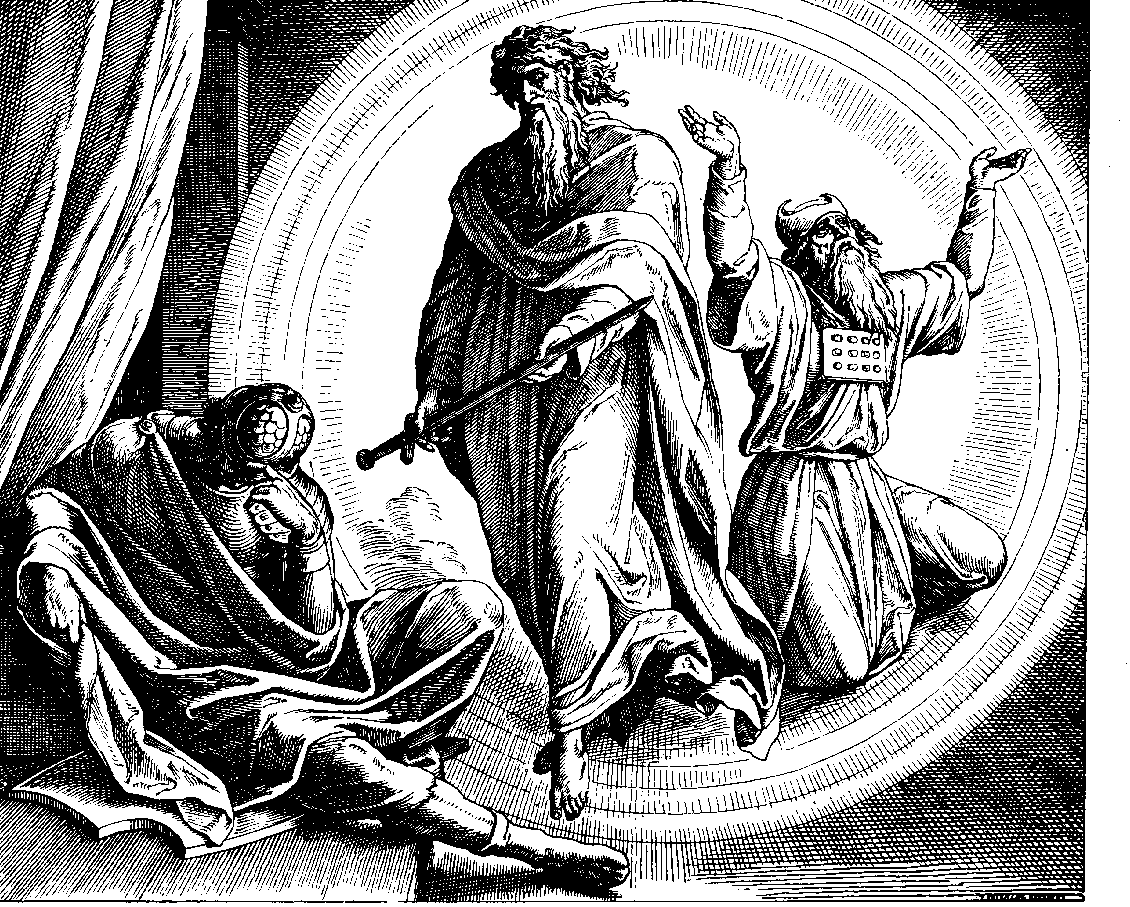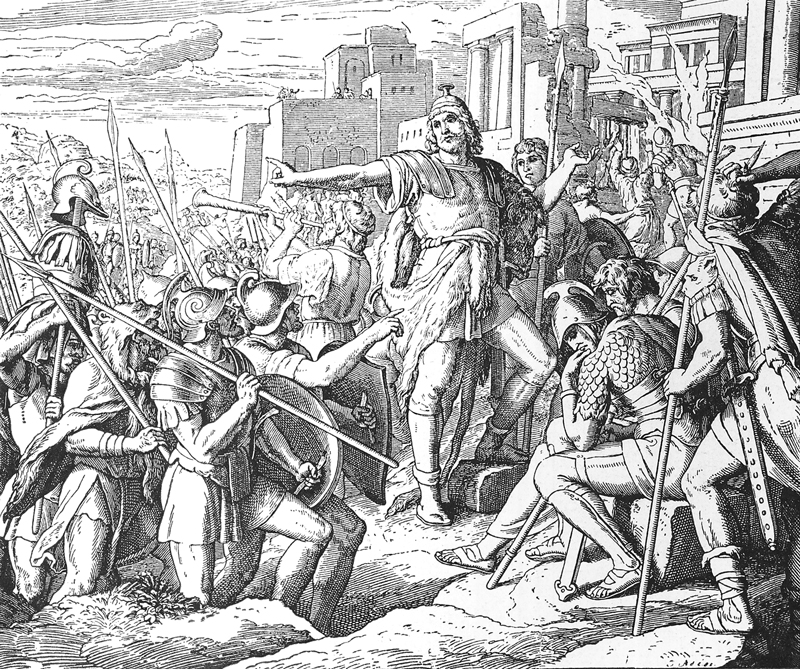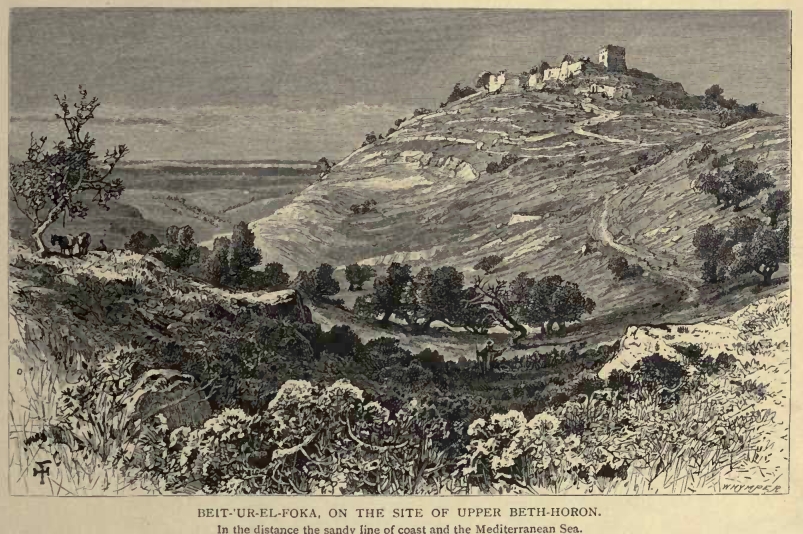|
Adasa
Adasa ( grc, Αδασά) is a city referred to in 1 Maccabees, being the site of the Syrian-Seleucid General Nicanor's death and Judah Maccabee's post in the battle of Adasa (during the Maccabean Revolt). It is said to be less than four miles from Beth-Horon Bethoron ( he, בֵית־חוֹרֹ֔ן, lit=house of Horon; grc, Ὡρωνείν), also Beth-Horon, was the name of two adjacent ancient towns strategically located on the Gibeon-Aijalon road, guarding the "ascent of Beth-Horon". The towns are ... ( 1 Macc 7:39). References Places in the deuterocanonical books Books of the Maccabees {{Jewish-hist-stub ... [...More Info...] [...Related Items...] OR: [Wikipedia] [Google] [Baidu] |
Battle Of Adasa
The Battle of Adasa was fought during the Maccabean revolt on the 13th of the month Adar (late winter, equivalent to March), 161 BC at Adasa ( he, חדשה), near Beth-horon. It was a battle between the rebel Maccabees of Judas Maccabeus (Judah Maccabee) and the Seleucid Empire, whose army was led by Nicanor. The Maccabees won the battle after killing Nicanor early in the fighting. The battle came after a period of political maneuvering over several months where the peace deal established a year earlier by Lysias was tested by new High Priest Alcimus, new military governor Nicanor, and Maccabee leader Judas Maccabeus. The date of the battle in the Hebrew calendar, 13 Adar, was celebrated as ''Yom Nicanor'' (Day of Nicanor) to commemorate the victory. Primary sources Nicanor's military governance of Judea, the Battle of Caphar-salama, and the Battle of Adasa are recorded in the book of 1 Maccabees (), the book of 2 Maccabees (, ), and in Josephus's ''Antiquities of the Jews'' ... [...More Info...] [...Related Items...] OR: [Wikipedia] [Google] [Baidu] |
Nicanor (Seleucid General)
Nicanor (; el, Nικάνωρ ''Nīkā́nōr''; died 161 BC) was a Syrian-Seleucid General under the kings Antiochus Epiphanes and Demetrius Soter. Early military career The son of Patroclus and one of the king's "chief friends" ( 2 Macc 8:9), After the defeat of Seron by Judas Maccabeus at the Battle of Beth Horon, Epiphanes entrusted his chancellor Lysias with the destruction of Judea ( 1 Macc 3:34). Nicanor was one of the three generals commissioned by Lysias; the others being Ptolemy, son of Dorymenes, and Gorgias (1 Macc 3:38). The campaign began in 166 BC; the Syrians were defeated at Emmaus (1 Macc 3:57), while Gorgias at a later stage gained a victory at Jamnia over a group of Jews who disobeyed Judas Maccabeus (1 Macc 5:58). The account given in 2 Maccabees differs considerably, both in omissions and in additions (2 Macc 8:9). There Nicanor, not Gorgias, is the chief in command. The battle of Emmaus is not mentioned, but "the thrice-accursed Nicanor," having in overwe ... [...More Info...] [...Related Items...] OR: [Wikipedia] [Google] [Baidu] |
Maccabean Revolt
The Maccabean Revolt ( he, מרד החשמונאים) was a Jewish rebellion led by the Maccabees against the Seleucid Empire and against Hellenistic influence on Jewish life. The main phase of the revolt lasted from 167–160 BCE and ended with the Seleucids in control of Judea, but conflict between the Maccabees, Hellenized Jews, and the Seleucids continued until 134 BCE, with the Maccabees eventually attaining independence. Seleucid King Antiochus IV Epiphanes launched a massive campaign of repression against the Jewish religion in 168 BCE. The reason he did so is not entirely clear, but it seems to have been related to the King mistaking an internal conflict among the Jewish priesthood as a full-scale rebellion. Jewish practices were banned, Jerusalem was placed under direct Seleucid control, and the Second Temple in Jerusalem was made the site of a syncretic Pagan-Jewish cult. This repression triggered exactly the revolt that Antiochus IV had feared, with a group o ... [...More Info...] [...Related Items...] OR: [Wikipedia] [Google] [Baidu] |
Judas Maccabeus
Judah Maccabee (or Judas Maccabeus, also spelled Machabeus, or Maccabæus, Hebrew: יהודה המכבי, ''Yehudah HaMakabi'') was a Jewish priest (''kohen'') and a son of the priest Mattathias. He led the Maccabean Revolt against the Seleucid Empire (167–160 BCE). The Jewish holiday of Hanukkah ("Dedication") commemorates the restoration of Jewish worship at the Second Temple in Jerusalem in 164 BCE, after Judah Maccabee removed all of the statues depicting Greek gods and goddesses and purified it. Life Early life Judah was the third son of Mattathias the Hasmonean, a Jewish priest from the village of Modi'in. In 167 BCE Mattathias, together with his sons Judah, Eleazar, Simon, John, and Jonathan, started a revolt against the Seleucid ruler Antiochus IV Epiphanes, who since 175 BCE had issued decrees that forbade Jewish religious practices. After Mattathias's death in 166 BCE, Judah assumed leadership of the revolt in accordance with the deathbed disposition of his ... [...More Info...] [...Related Items...] OR: [Wikipedia] [Google] [Baidu] |
1 Maccabees
The First Book of Maccabees, also known as First Maccabees (written in shorthand as 1 Maccabees or 1 Macc.), is a book written in Hebrew by an anonymousRappaport, U., ''47. 1 Maccabees'' in Barton, J. and Muddiman, J. (2001)The Oxford Bible Commentary, p. 711 Jewish author after the restoration of an independent Jewish kingdom by the Hasmonean dynasty, around the late 2nd century BC. The original Hebrew is lost and the most important surviving version is the Greek translation contained in the Septuagint. The book is held as canonical scripture by the Catholic, Orthodox, and Oriental Orthodox churches (except for the Orthodox Tewahedo), but not by Protestant denominations nor any major branches of Judaism; it is not part of the Hebrew Bible. Some Protestants consider it to be an apocryphal book (see also Deuterocanonical books). 1 Maccabees is best known for its account of an early victory in the Maccabean Revolt against the Seleucid Empire: the recapture of Jerusalem in the year ... [...More Info...] [...Related Items...] OR: [Wikipedia] [Google] [Baidu] |
Syrian
Syrians ( ar, سُورِيُّون, ''Sūriyyīn'') are an Eastern Mediterranean ethnic group indigenous to the Levant. They share common Levantine Semitic roots. The cultural and linguistic heritage of the Syrian people is a blend of both indigenous elements and the foreign cultures that have come to inhabit the region of Syria over the course of thousands of years. The mother tongue of most Syrians is Levantine Arabic, which came to replace the former mother tongue, Aramaic, following the Muslim conquest of the Levant in the 7th century. The conquest led to the establishment of the Caliphate under successive Arab dynasties, who, during the period of the later Abbasid Caliphate, promoted the use of the Arabic language. A minority of Syrians have retained Aramaic which is still spoken in its Eastern and Western dialects. In 2018, the Syrian Arab Republic had an estimated population of 19.5 million, which includes, aside from the aforementioned majority, ethnic minorities such as ... [...More Info...] [...Related Items...] OR: [Wikipedia] [Google] [Baidu] |
Seleucid
The Seleucid Empire (; grc, Βασιλεία τῶν Σελευκιδῶν, ''Basileía tōn Seleukidōn'') was a Greek state in West Asia that existed during the Hellenistic period from 312 BC to 63 BC. The Seleucid Empire was founded by the Macedonian general Seleucus I Nicator, following the division of the Macedonian Empire originally founded by Alexander the Great. After receiving the Mesopotamian region of Babylonia in 321 BC, Seleucus I began expanding his dominions to include the Near Eastern territories that encompass modern-day Iraq, Iran, Afghanistan, Syria, all of which had been under Macedonian control after the fall of the former Persian Achaemenid Empire. At the Seleucid Empire's height, it had consisted of territory that had covered Anatolia, Persia, the Levant, and what are now modern Iraq, Kuwait, Afghanistan, and parts of Turkmenistan. The Seleucid Empire was a major center of Hellenistic culture. Greek customs and language were privileged; the wide variet ... [...More Info...] [...Related Items...] OR: [Wikipedia] [Google] [Baidu] |
General
A general officer is an Officer (armed forces), officer of highest military ranks, high rank in the army, armies, and in some nations' air forces, space forces, and marines or naval infantry. In some usages the term "general officer" refers to a rank above colonel."general, adj. and n.". OED Online. March 2021. Oxford University Press. https://www.oed.com/view/Entry/77489?rskey=dCKrg4&result=1 (accessed May 11, 2021) The term ''general'' is used in two ways: as the generic title for all grades of general officer and as a specific rank. It originates in the Tudor period, 16th century, as a shortening of ''captain general'', which rank was taken from Middle French ''capitaine général''. The adjective ''general'' had been affixed to officer designations since the late Middle Ages, late medieval period to indicate relative superiority or an extended jurisdiction. Today, the title of ''general'' is known in some countries as a four-star rank. However, different countries use di ... [...More Info...] [...Related Items...] OR: [Wikipedia] [Google] [Baidu] |
Beth-Horon
Bethoron ( he, בֵית־חוֹרֹ֔ן, lit=house of Horon; grc, Ὡρωνείν), also Beth-Horon, was the name of two adjacent ancient towns strategically located on the Gibeon-Aijalon road, guarding the "ascent of Beth-Horon". The towns are mentioned in the Hebrew Bible and in other ancient sources: Upper Bethoron appears in ''Joshua'' and Lower Bethoron in ''Joshua'' and '' 1 Chronicles'' and I Maccabees 3:16. The ancient towns of Upper Bethoron and Lower Bethoron are identified respectively with the present day Palestinian Arab villages of Beit Ur al-Fauqa and Beit Ur al-Tahta, which are believed to preserve the ancient names. Etymology The Hebrew name Bethoron (Beit Horon, ) is derived from the name of an Egypto- Canaanite deity, ''Horon'', mentioned in Ugaritic literature. The city is mentioned among the cities and towns smitten by Sheshonq I in his inscription at the Temple of Karnak as Batae Houarn. History Upper Bethoron is mentioned several times in the Hebrew ... [...More Info...] [...Related Items...] OR: [Wikipedia] [Google] [Baidu] |
Places In The Deuterocanonical Books
Place may refer to: Geography * Place (United States Census Bureau), defined as any concentration of population ** Census-designated place, a populated area lacking its own municipal government * "Place", a type of street or road name ** Often implies a dead end (street) or cul-de-sac * Place, based on the Cornish word "plas" meaning mansion * Place, a populated place, an area of human settlement ** Incorporated place (see municipal corporation), a populated area with its own municipal government * Location (geography), an area with definite or indefinite boundaries or a portion of space which has a name in an area Placenames * Placé, a commune in Pays de la Loire, Paris, France * Plače, a small settlement in Slovenia * Place (Mysia), a town of ancient Mysia, Anatolia, now in Turkey * Place, New Hampshire, a location in the United States * Place House, a 16th-century mansion largely remodelled in the 19th century, in Fowey, Cornwall * Place House, a 19th-century mansion on ... [...More Info...] [...Related Items...] OR: [Wikipedia] [Google] [Baidu] |





